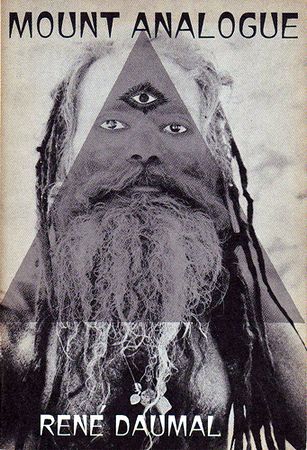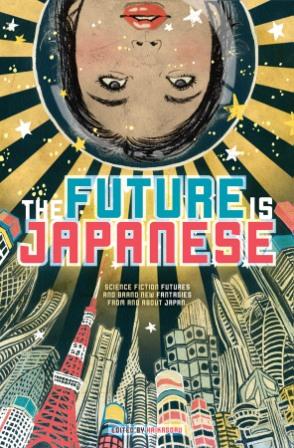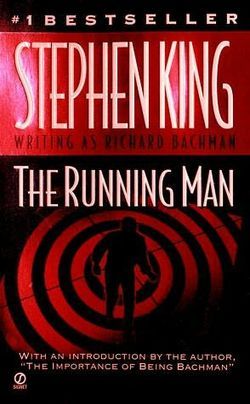 If my head is a hotel, this book is a guest that stayed overnight, and left its wallet behind. It’s a tiny volume that can be read in about half an hour, but when you’re done, you’re left with a maddening sense of being entangled in unfinished business.
If my head is a hotel, this book is a guest that stayed overnight, and left its wallet behind. It’s a tiny volume that can be read in about half an hour, but when you’re done, you’re left with a maddening sense of being entangled in unfinished business.
It’s about a group of metaphysically-minded mountaineers who, noting that mountains so often appear in metaphors, myths, and thought experiments, believe that there is an actual “Mount Analogue” somewhere on the globe…a literal metaphor, paradoxical though that sounds. They set out on a journey to find this hypothetical mountain, and in a far off non-Euclidean land, they succeed.
The book ends with them beginning to climb the mountain’s slope. The author died before he could finish the book, leaving the reader forever stranded at the foothills of what seems like an epiphany. If you want a comparison, this book reminds me of the third part of Gulliver’s Travels, the part few remember yet is in some ways the most thoughtful section of the book. It’s not really action-driven, and although it contains lots of interesting spectacles, it’s implicitly concerned with what’s happening inside the onlooker’s head.
For a book with its head in the clouds, Mount Analogue’s characters are often preoccupied with practical matters, such as bartering for supplies in foreign countries, and setting up outposts in case the quest takes longer than expected. Some of the mountaineers forsake their quest and return home – an enjoyable touch. Where’s the excitement in climbing a mountain if just anyone can do it?
But it’s also fantastic, involving humans made of negative space, and “peradams”: strange gemstones that can only be found by people truly in need of them. Again the Gulliver’s Travels comparisons come out, because he does not let the main thrust of the story distract him from interesting philosophical and moral asides. If he’d left these out, he might have successfully completed the book before his death. But it might also have been a poorer book, a less stimulating book.
Daumal’s wit and writing might be knee-slappingly Gallic (“A knife is neither true nor false, but anyone impaled on its blade is in error.”), but I think Mount Analogue also of course the “Time between Times” marking the demarcations of night and dawn. What’s a mountain except the space between heaven and earth? Or in this story’s case, the space between reality and metaphor?
I am interested to learn where Daumal was going with all this. Due to his death, I will never know. Mount Analogue is a rare thing – a great book that I’m not sure that you should read.
 Good collection partially ruined by honkies trying to be as “Japanese” as possible. Some of these stories read like a blizzard of Japanese buzzwords…calligraphy, mecha robots, kamikaze, tea ceremonies, etc. I suppose they were trying to retain the essence of Japan, but the effect is one of contrivance, and artifice. It’s a bit like the joke that in the movies, you can see the Eiffel Tower out of every window in France.
Good collection partially ruined by honkies trying to be as “Japanese” as possible. Some of these stories read like a blizzard of Japanese buzzwords…calligraphy, mecha robots, kamikaze, tea ceremonies, etc. I suppose they were trying to retain the essence of Japan, but the effect is one of contrivance, and artifice. It’s a bit like the joke that in the movies, you can see the Eiffel Tower out of every window in France.
Catherynne M Valente’s “One Breath, One Stroke” left me feeling bored and toyed with. Bruce Sterling’s “Goddess of Mercy” is stronger, and has an interesting sociopolitical tilt, but the story ends up not going anywhere. “The Indifference Engine”, by contrast, is a Japanese author trying to be as American as possible. A tragic tale of an African soldier trying to adjust to life at the end of a war, this is the kind of story that wants to be up on a Hollywood movie billboard with the words “HEARTBREAKING” and “POWERFUL” I found it heavy-handed, unpleasant, and emotionally manipulative.
The remaining stories are good or excellent. Ken Liu’s “Mono no Aware” is an obvious standout – exciting, fresh, and accessible, like a Studio Ghibli movie. After the wreck of the Earth, humanity’s remnants are escaping into space and trying to hang on to the flying pieces of civilisation. Felicity Savage’s “The Sound of Breaking Up” was a clever story about online relationships, like Neal Stephenson’s Snow Crash evolved to the next logical iteration.
Toh EnJoe’s “Endoastronomy” is about a future where the constellations seem to be changing in the night sky, and it reminds of the surreality and wit of older writers like Morio Kita and Ryo Hanmura. Ekaterina Sedia’s “Whale Meat” draws comparisons to Murakami. It’s slow moving and not entirely sure of where it’s going, but it holds the reader’s interest.
But the greatest moment of the collection is Tobi Hirotaka’s “Autogenic Dreaming”, which astonished and shocked me. A revolutionary – and nearly godlike – internet search engine called GEB (a reference to Hofstadter’s Gödel, Escher, Bach, I presume) has turned rogue, and a long-dead serial killer is digitally reconstructed to help save the world from death via Google.
The premise is otherworldly and bizarre, but the story never loses its sinewy power, blurring vignettes and flashbacks and technical exposition. From my quick searching, it seems this is Hirotaka’s first publication credit in English. I hope it will not be the last. On the strength of “Autogenic Dreaming”, it’s possible we’re dealing with a true master of science fiction.
Future falls short of consistent greatness, but the good stories more or less patch over the bad ones, and there’s a couple of incredible standouts that almost sell the collection on their own. I hope we get a The Future is Weeaboo 2 at some point.
 This nasty story from future could only have been written by a nasty man from the past, 1980s Stephen King. This was back in the day when he didn’t care, when he broke rules, when he threw “faggot” and “nigger” around liberally, and when he wasn’t pants-wettingly anxious about being a remembered as a Great American Author. He was already something far better than that: a good writer.
This nasty story from future could only have been written by a nasty man from the past, 1980s Stephen King. This was back in the day when he didn’t care, when he broke rules, when he threw “faggot” and “nigger” around liberally, and when he wasn’t pants-wettingly anxious about being a remembered as a Great American Author. He was already something far better than that: a good writer.
He was considered trash at the time. But even if he was, he was a unique kind of trash that defies obvious and easy comparison. Ray Bradbury wishes he was this pissed off. Harlan Ellison wishes he was this coherent. Dean Koontz wishes he was this misanthropic. Apparently the entire book was written over the course of a week, which works just fine – he doesn’t have the chance to get snarky and arch and clever-clever.
The plot is familiar to all, and honestly, not all that sensible. At one point, he moves the story to its next junction by giving the main character a supernatural vision. Then at the end, King can’t figure out what to do, so he blows everyone up. But the story always seemed secondary to The Running Man. The real star is King’s gritty, quasi-cyberpunk world, which he shows off through flashbacks, monologues, and those unexpected shots across the bow King is so good at. A good example of the latter is when the main character meets a woman with full breasts, and concludes she must be corrupt or criminal (because she’s eating well.)
The pace is breakneck. You’re afraid to stop reading because you might get whiplash. The book simply doesn’t have a dull or boring moment, from the man’s run-in with gangsters with hearts full of gold (and lungs full of cancer), to the incredible high-stakes bluffing game at the airport, to the final catastrophic flight to the FreeVee offices. It’s impossible that an out of work every-man could be this good at outshooting and outwitting trained killers, but the relentless pace of the book quashes these objections in your mind. You can’t smell a fart when they’re travelling at Mach 3.
This is one of those “look at me” books that does anything for your attention, and tries to be bigger and louder than a movie. A comparison to Ellison seems appropriate here, because he’s also known for doing anything in his stories for the sake of holding a punter’s attention. But unlike Ellison, King doesn’t seem to have Narcissistic personality disorder, so I don’t know what his excuse is.
This is the best Bachman book (although Misery would have edged it out, had it been released under that name), and probably the darkest and grittiest of King’s novels. 1984 pastiches are dull and overfamiliar these days, and so are cautionary tales about couch potatoes and reality TV, but The Running Man still scorches and sizzles on the page. This isn’t a maudlin, sentimental old man who writes with his literary reputation first and foremost in mind. This is 1980s Stephen King. Don’t walk, run.
 If my head is a hotel, this book is a guest that stayed overnight, and left its wallet behind. It’s a tiny volume that can be read in about half an hour, but when you’re done, you’re left with a maddening sense of being entangled in unfinished business.
If my head is a hotel, this book is a guest that stayed overnight, and left its wallet behind. It’s a tiny volume that can be read in about half an hour, but when you’re done, you’re left with a maddening sense of being entangled in unfinished business.
 Good collection partially ruined by honkies trying to be as “Japanese” as possible. Some of these stories read like a blizzard of Japanese buzzwords…calligraphy, mecha robots, kamikaze, tea ceremonies, etc. I suppose they were trying to retain the essence of Japan, but the effect is one of contrivance, and artifice. It’s a bit like the joke that in the movies, you can see the Eiffel Tower out of every window in France.
Good collection partially ruined by honkies trying to be as “Japanese” as possible. Some of these stories read like a blizzard of Japanese buzzwords…calligraphy, mecha robots, kamikaze, tea ceremonies, etc. I suppose they were trying to retain the essence of Japan, but the effect is one of contrivance, and artifice. It’s a bit like the joke that in the movies, you can see the Eiffel Tower out of every window in France. 